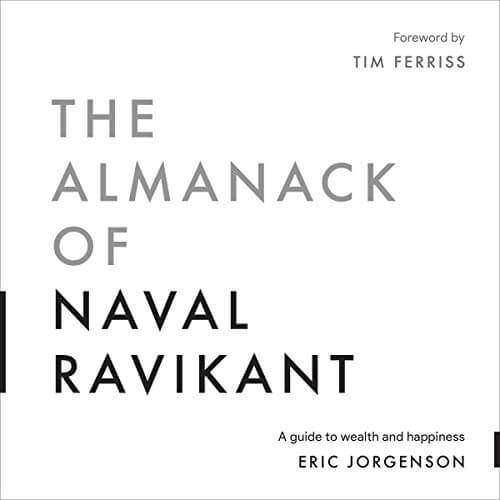
A few days ago, I visited my brother’s condo in downtown Columbus where he had a copy of The Almanack of Naval Ravikant: A Guide to Wealth and Happiness sitting on the coffee table. When we asked him about the book, he described Naval as “one of the wisest people alive,” which is as glowing an endorsement anyone could give an author. I don’t always act on book recommendations, but this week I decided to take my brother up on one of his favorites.
The Almanack of Naval Ravikant is unique in that it addresses both wealth and happiness, two giant themes that are rarely treated concurrently. Naval’s balanced, holistic outlook on life is not what you might expect from a serial entrepreneur whose net worth exceeds $60 million. Money, for Naval, “will solve all your money problems,” but the love of money, he asserts, is an insatiable desire that leads down a path of misery.
Naval says he has a habit of mining books for knowledge and will often not read them from cover to cover. I also learned this skill in college, but I can say that I intently read every word of his almanack. In the process, I typed up a myriad of quotes/excerpts that I thought were worth stashing, which I have consolidated for this article. Below you can find 50+ hand-picked quotes/excerpts that I found inspirational, thought-provoking, or just plain insightful.
Overall, the ~six hours or so I invested in this book were well worth the investment. I recommend you grab a copy and see for yourself what made this work, collated by Eric Jorgenson, the #1 best-seller in numerous categories on Amazon.

50 Insightful Quotes From The Almanack of Naval Ravikant: A Guide to Build Wealth and Happines
Technology democratizes consumption but consolidates production. The best person at anything in the world gets to do it for everyone.
#1
No one can compete with you on being you. Most of life is a search for who and what needs you the most.
#2
The group of scientists who made real breakthroughs and contributions probably added more to human society, I think, than any other single class of human beings. Not to take away anything from art or politics or engineering or business, but without science, we’d still be scrambling in the dirt, fighting with sticks, and trying to start fires.
#3
Specific knowledge is found much more by pursuing your innate talents, your genuine curiosity, and your passion. It’s not by going to school for whatever is the hottest job. It’s not by going into whatever field investors say is the hottest.
#4
The internet enables any niche interest, as long as you’re the best person at it, to scale out.
#5
Escape competition through authenticity. Basically, when you’re competing with people, it’s because you’re copying them. It’s because you’re trying to do the same thing. But every human is different. Don’t copy.
#6
The most important skill for getting rich is becoming a perpetual learner.
#7
Basic arithmetic and numeracy are way more important in life than doing calculus. Similarly, being able to convey yourself simply using ordinary English words is far more important than being able to write poetry, having an extensive vocabulary, or speaking 7 different languages. Knowing how to be more persuasive when speaking is far more important than being an expert digital marketer or click optimizer. Foundations are key.
#8
Intentions don’t matter, actions do. That’s why being ethical is hard.
#9
The reason I say this is not to make some glib comment about how 99% of your life is wasted and only 1% is useful. I say this because you should be very thoughtful and realize in most things — relationships, work, even in learning — what you’re trying to do is find the thing you can go all-in on to earn compound interest. When you’re dating, the instance you know this relationship is not going to be the one that leads to marriage, you should probably move on. When you’re studying something, like a geography or history class, and you realize you’re never going to use the information, drop the class. It’s a waste of your time. It’s a waste of your brain energy. I’m not saying don’t do the 99% because it’s very hard to identify what the 1% is. What I’m saying is when you find the 1% of your discipline, which will not be wasted, which you will be able to invest in for the rest of your life and has meaning to you, go all-in, and forget about the rest.
#10
Accountability is a double-edged thing. It allows you to take credit when things go well and to bear the brunt of the failure when things go badly.
#11
We live in an age of infinite leverage, and the economic rewards for genuine intellectual curiosity have never been higher. Following your genuine intellectual curiosity is a better foundation for a career than following whatever is making money right now.
#12
If it entertains you now but will bore you some day, it’s a distraction. Keep looking.
#13
I only really want to do things for their own sake. That is one definition of art. Whether it’s business, exercise, romance, friendship — whatever. I think the meaning of life is to do things for their own sake. Ironically, when you do things for their own sake, you create your best work.
#14
You get rewarded by society for giving it what it wants and doesn’t know how to get it elsewhere.
#15
There are three broad classes of leverage. One form of leverage is labor — other humans working for you. It is the oldest form of leverage and actually not a great one in the modern world. I would argue this is the worst form of leverage that you could possibly use. Managing other people is incredibly messy. It requires tremendous leadership skills. You’re one short hop from a mutiny or getting eaten or torn apart by the mob.
#16
The final form of leverage is brand new, the most democratic form. It is products with no marginal cost of replication. This includes books, media, movies, and code… Now you can multiply your efforts without involving other humans and without needing money from other humans… This newest form of leverage is where all the new fortunes are made.
#17
Humans evolved in societies where there was no leverage… If I was chopping wood or carrying water for you, you knew that 8 hours put in would equal 8 hours of output… With a leveraged worker, judgment is far more important than how much time they put in or how hard they work.
#18
If you have specific knowledge, you have accountability, and you have leverage, they have to pay you what you’re worth. If they pay you what you’re worth, then you can get your time back. You can be hyper-efficient. You’re not doing meetings for meetings’ sake. You’re not trying to impress other people. You’re not writing things down to make it look like you did work. All you care about is the actual work itself.
#19
No one is going to value you more than you value yourself.
#20
Wealth creation is an evolutionarily recent positive-sum game. Status is an old zero-sum game. Those attacking wealth creation are often just seeking status. . . They’re playing a different game, and it’s a worst game. It’s a zero-sum game instead of a positive-sum game.
#21
The problem is to win at a status game, you have to put somebody else down. That’s why you should avoid status games. They make you into an angry, combative person. You’re always fighting to put other people down, to put yourself and the people you like up.
#22
Retirement is when you stop sacrificing today for an imaginary tomorrow. When today’s complete, in and of itself, you’re retired. . . Well, one way is to have so much money saved that your passive income, without you lifting a finger, covers your burn rate. A second is you just drive your burn rate down to zero. You become a monk. A third is you’re doing something you love. You enjoy it so much, it’s not about the money.
#23
Art is creativity. Art is anything done for its own sake. What are the things that are done for their own sake and there’s nothing behind them? Loving somebody, creating something, playing. To me, creating businesses is play. I create busineses because it’s fun, because I’m into the product… It makes money almost a side-effect… My motivation has shifted from being goal-oriented to being artistic. Ironically, I think I’m much better at it now.
#24
The punishment for the love of money is delivered at the same time as the money. As you make money, you just want even more, and you become paranoid and fearful of losing what you do have… I think the best way to stay away from this constant love of money is to not upgrade your lifestyle as you make money.
#25
To summarize the fourth type [of luck], build your character in a certain way, then your character becomes your destiny.
#26
Trying to build business relationships (networking) well in advance of doing business businesses is a complete waste of time.
#27
Sharks eat well, but live a life surrounded by sharks.
#28
Your only failures are written within your psyche and they are obvious to you. If you have too many of these moral shortcomings, you will not respect yourself. The worst outcome in this world is not having self-esteem. If you don’t love yourself, who will? I think you just have to be very careful about doing things you are fundamentally not going to be proud of, because they will damage you.
#29
I have this saying inside my head: the closer you want to get to me, the better your values have to be.
#30
The most common bad advice I hear is “You’re too young.” Most of history was built by young people, they just got credit when they were older. The only way to truly learn something is by doing it. Yes, listen to guidance, but don’t wait.
#31
Your real resume is just a catalog of all your suffering… Anything you’re given doesn’t matter. You have to do hard things to create your own meaning in life.
#32
Most of the time, the person you have to become to make money is a high-anxiety, high-stress, hard-working, competitive person. When you have done that for 20, 30, 40, 50 years and you suddenly make money, you can’t turn it off. You’ve trained yourself to be a high-anxiety person. Then you have to learn how to be happy.
#33
My definition of wisdom is knowing the long-term consequences of your actions. Wisdom applied to external problems is judgment.
#34
You can only make progress when you’re starting with the truth. The hard thing is seeing the truth. To see the truth, you have to get your ego out the way because your ego doesn’t want to see the truth.
#35
What you feel tells you nothing about the facts. It merely tells you something about your estimate of the facts.
#36
It’s only after you’re bored, you have the great ideas.
#37
Tension is who you think you should be. Relaxation is who you are.
#38
If all your beliefs line up into neat little bundles, you should be highly suspicious.
#39
“Praise specifically, criticize generally” [quoting Warren Buffet]. Then people’s egos and identities don’t work against you. They work for you.
#40
Charisma is the ability to project love and confidence at the same time.
#41
“If you want it done, then go. If not, then send” [quoting Julius Caesar]. When you are the principal, you are the owner. You care and will do a great job. When you are the agent and you are doing it on somebody else’s behalf, you can do a bad job. You just don’t care. You optimize for yourself rather than the principal’s assets… The more closely you can tie someone’s compensation to the exact value they’re creating, the more you turn them into a principal, and the less you turn them into an agent.
#42
If you can’t decide, the answer is no.
#43
Pointing out obvious exceptions implies either the target isn’t smart or you aren’t.
#44
It’s not about educated versus uneducated. It’s about “likes to read” and “doesn’t like to read.”
#45
[Question to Naval] “What can I do for the next 60 days to become a clearer, more independent thinker?” Read the greats in math, science, and philosophy. Ignore your contemporaries and news. Avoid tribal identification. Put truth above social approval.
#46
The fewer desires I can have, the more I can accept the current state of things, the less my mind is moving— because the mind really exists in motion toward the future or the past — the more present I am, the happier and more content I will be.
#47
Happiness is what there is when you remove the sense that something is missing in your life.
#48
Happiness, love, and passion aren’t things you find; they’re choices you make.
#49
Desire is a contract that you make with yourself to be unhappy until you get what you want. Every desire is a chosen unhappiness.
#50
Today, the way we think you get peace is by resolving all your external problems, but there are unlimited external problems. The only way to actually get peace on the inside is giving up this idea of problems.
#51
The enemy of peace of mind is expectations drilled into you by society and other people.
#52
At the end of the day, you are a combination of your habits and the people you spend the most time with.
#53
You don’t make any decisions if you don’t judge anything. You just accept everything. If I do that for ten or fifteen minutes while walking around, I end up in a very peaceful, grateful state.
#54
Hiking is walking meditation. Journaling is writing meditation. Praying is gratitude meditation. Showering is accidental meditation. Sitting quietly is direct meditation.
#55
Courage isn’t charging into a machine-gun nest. Courage is not caring what other people think.
#56
Inspiration is perishable. Act on it immediately.
#57

